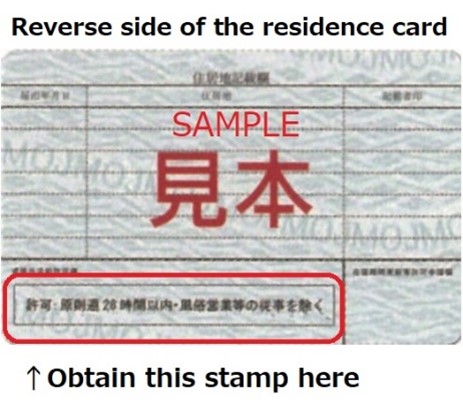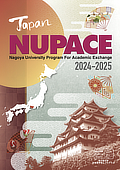Top Page > Spring 2022
Spring 2022
We, at Nagoya University, wish to extend a heartfelt welcome to all of those students who are coming to Japan this spring to participate in the Nagoya University Program for Academic Exchange (NUPACE). For your reference, please find information on the program and life in Japan as follows:
1. Information Required by NUPACE before Arrival <IMPORTANT>
As soon as you have confirmed your travel itinerary register the following details at the itinerary registration form, which have been provided via email.
- Flight route (including transiting airport, if applicable)
- Flight No. and airport of arrival into Japan
- Scheduled arrival date and time at the airport of landing
- Date and approximate time of your arrival at the student residence
*If, after registration, you decide to change your travel itinerary, especially your arrival time at the student residence, make sure to notify the NUPACE Office of the revised schedule and emend the information on AMARYS as well. This is important because University staff/students will be waiting at the dormitory to help you with moving-in procedures at the stipulated time.
2. Passport, Visa and Registration Matters
2-1 Students Entering Japan on a Non-Japanese Passport
Your ‘Uketzukezumi-sho’, ‘Certificate of Eligibility’, and ‘Letter of Admission’, the documents required for visa procedures, have been sent to you from the Student Exchange Division (SED). Once you have received the documents, promptly take them, and any other relevant documentation, to the nearest Japanese diplomatic mission in order to apply for a ‘student’ visa.
2-2 Landing Procedures and Confirmation of Residence Card
In addition to the procedures for entering and quarantining in Japan*, as part of landing procedures, you will be required to submit your fingerprints and facial photograph at immigration control. Also, when you receive your residence card at the airport, please check whether the spelling and spacing of your name are correct.
*Refer to the information provided via email on March 18th for details on procedures for entering and quarantining in Japan.
3. Part-time Work Permit (Students entering Japan on a Non-Japanese Passport)

Permission to engage in part-time work can be applied for and approved at any international airport in Japan. Students interested in working part-time should fill out the application form attached to this e-mail and submit it upon arrival at the airport. Once you have applied for the permit, please confirm that there is a permission statement and stamp on the reverse side of your residence card. If you do not receive a stamp even though you applied for permission, please ask the officer to stamp the card right away.
NB. Part-time work restrictions do not apply to Long Term Residents or Japan nationals.
4. Moving into Student Dormitories
Accommodation information has been provided via email on March 25th. All students are requested to make their own way to the dormitories directly from airports or hotels. It takes approximately one hour from Central Japan International Airport, and half an hour from Nagoya station, to reach each dormitory. Make sure to have your ‘Approval of Admission’ prepared to present it to the residence staff.
After leaving your luggage in your room and receiving materials, please come to the NUPACE office for registration procedures. Take your residence card and passport with you. NUPACE office hours: 9:30-16:00.
5. Orientation and Academic Schedule
The NUPACE orientation program will be held between March 31 and April 6, 2022. All students must ensure that they do not miss any session relevant to them. If you are not able to attend a session, inform the NUPACE office in advance. Refer to the ‘Orientation Schedule-Spring Semester 2022’, which is available through the NUSS link sent via email on March 29th.
Life Orientation will be conducted after students have arrived to Nagoya. Please DO NOT complete procedures at the local municipal office before the orientation. As procedures comprise not only moving-in notification, but also application for your health insurance and pension waiver, NUPACE has prepared materials which will facilitate the process.
The NUPACE academic calendar 2022-2023 runs as follows:
Spring 2022 Semester
| Orientations (Academic, etc.): | March 31 to April 6, 2022 |
| Academic Semester Commences: | Monday, April 11, 2022 |
| Academic Semester Ends: | Sunday, August 7, 2022 |
Autumn 2022 Semester
| Orientations (Academic, etc.): |
From late September (Tentative) *Academic Orientation is mandatory for continuing students from the spring semester. |
| Academic Semester Commences: | Monday, October 3, 2022 |
| Academic Semester Ends: |
Wednesday, February 8, 2023 (Winter Holiday: Tuesday, December 28, 2022 - Friday, January 7, 2023) |
Course registration procedures are explained at the academic orientation.
6. Insurances
All NUPACE students are required to subscribe the Japan National Health Insurance (JNHI) program after arrival, irrespective of duration of stay in Japan, or prior enrolment in an insurance program in their home country. For a monthly premium of approximately ¥1,800, JNHI policy holders are entitled to a 70% discount on most medical and dental fees incurred.
Since students apply for the JNHI at a local municipal office after arriving to their accommodation after the quarantine period, you will not be benefits from JNHI during the quarantine period. Before entering Japan, please make sure to purchase medical insurance, such as travel insurance, that covers your quarantine period. For those who are not required to quarantine, purchase the travel insurance from the date of your departure until the approximate date you may be visiting the local municipal office.
All NUPACE students are also required to subscribe to the ‘Personal Liability Insurance for Students’ offered by Nagoya University Co-op, even if they have already taken out such insurance in their home country. The Insurance fee is ¥1,800 per year and it covers up to 100 million yen of damages to a third party. Although application for personal liability insurance requires the purchase of student co-op membership, the membership fee (¥4,000) will be refunded prior to your departure.
7. Money Matters
Ensure that you have enough money with you when you enter Japan, preferably in Japanese yen, to help defray initial expenses. We recommend a minimum of ¥150,000.
*Please note that US nationals are required to declare their TIN or SSN numbers when opening a bank account.
Independently-financed students are responsible for opening their own bank or post-office accounts. (Opening bank accounts is not mandatory.)
| MUFJ Bank: |
For international remittance when the remittance is completed through the internet-banking, approximately ¥3,000 will be charged as a transfer fee, while ¥7,500 will be charged when completed at the teller. Please refer to http://www.bk.mufg.jp/tesuuryou/gaitame.html (Only in Japanese) |
| Japan Post Bank: | Please refer to http://www.jp-bank.japanpost.jp/en/djp/en_djp_index.html |




